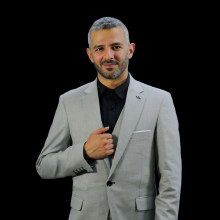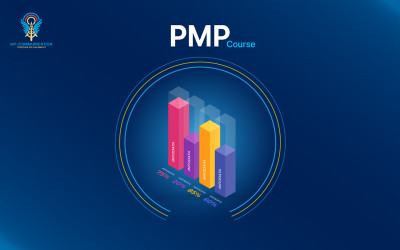Turn Every Project into a Success Story... Start Here!
The Project Management Professional (PMP)® course is a foundational step for anyone aiming for excellence in project management. It is designed to deliver a complete range of project management skills—from initiation to closure. The course also includes a comprehensive understanding of globally recognized frameworks such as the PMBOK® Guide, a fundamental reference for professional project management.
The course dives into advanced topics such as planning, scheduling, cost management, risk control, and team leadership. The focus is on equipping you with the tools and knowledge needed to navigate complex project challenges in dynamic work environments—professionally and precisely.
As you progress through the course, your skills expand: planning becomes more accurate, scheduling more efficient, costs are controlled, and risks are managed intelligently. Most importantly, your ability to lead teams with professionalism—even in the toughest situations—is greatly enhanced.
Every challenge—you’re ready for it!
General Objectives of the Project Management Professional (PMP) Course
The goal of My Communication Academy is to equip trainees with the skills and capabilities that qualify them to become experts in project management by applying globally recognized methodologies :
• Prepare trainees for the PMP certification exam, a global standard of excellence in project management
• Improve participants' employability and marketability
• Develop leadership and team management capabilities
• Teach advanced planning and execution techniques
• Enhance understanding of risk management
• Apply concepts to real-world projects
• Stay aligned with modern project management technologies
Who Can Benefit from the Project Management Professional (PMP) Course Offered by My Communication Academy ?
At My Communication Academy, we are committed to designing courses that provide maximum value to the broadest possible range of professionals in the fields of telecommunications and information technology.
The Project Management Professional (PMP) course has been carefully developed to address the diverse needs of individuals seeking to strengthen their managerial and practical skills.
Whether aiming to ensure the success of their current projects or accelerate their career progression in project management, this course is designed to support their goals with practical tools, global standards, and proven methodologies .
• Project managers aiming to refine their skills and earn a globally recognized certificate
• Telecom engineers working on ICT projects
• IT professionals seeking to develop managerial capabilities
• Project team members wanting a better grasp of project management fundamentals
• Executives and leaders pursuing project execution mastery
• Consultants specializing in project-based solutions
PMP Course Modules
The course includes ten structured and accessible modules:
Module 1: Introduction to Project Management
• Understanding project management and its importance in organizational success.
• Distinguishing between project management, program management, and portfolio management.
• Discussing the role of operations management in facilitating project changes.
• Exploring the main phases of a project and expected deliverables.
• Reviewing the project lifecycle and how each phase is managed.
• Exploring project governance and how to ensure effective oversight and control.
• Identifying stakeholders and their role in decision-making.
• Clarifying the key responsibilities of the project manager in ensuring success
Module 2: Project Management Terminology
• Studying the difference between milestones and tasks, and how to define them within a project.
• Understanding the different roles in a project and how responsibilities are assigned.
• Exploring the role of the Project Management Office (PMO).
• Discussing organizational structures and their impact on project flow.
• Examining project constraints such as cost, time, scope, and quality.
• Comparing different project management approaches and choosing the right one.
• Differentiating between product management and project management.
• Understanding issues, risks, assumptions, and constraints within a project.
• Exploring the differences between leadership and management, and how to develop leadership skills.
• Highlighting the importance of emotional intelligence in project leadership and management.
Module 3: Project Management Principles
• Emphasizing the importance of being accurate, respectful, and engaged in project management.
• Creating a collaborative environment that positively impacts the team.
• Exploring effective stakeholder engagement techniques.
• Focusing on value delivery and how to maximize it.
• Understanding system interactions and how to evaluate and respond to them.
• Prioritizing and making decisions that support added value in the project.
Module 4: Leadership Applications in Project Management
• Studying effective leadership behaviors within the project environment.
• Designing communication environments that encourage team participation.
• Exploring strategies for leading through project challenges.
• Focusing on techniques for risk response and adaptability within teams.
• Ensuring successful change to meet future project goals.
Module 5: Stakeholder and Team Performance
• Implementing an effective stakeholder performance plan.
• Promoting team collaboration to ensure project success.
• Understanding team culture and its influence on performance.
• Discussing practical applications to improve teamwork and achieve shared goals.
• Developing flexible methodologies for enhancing collaboration in multicultural teams.
Module 6: Project Planning
• Learning project planning techniques and tools.
• Accurately estimating requirements and tasks.
• Developing a project schedule and forecasting deadlines.
• Using KPIs to measure performance.
• Addressing uncertainty through agile and flexible approaches.
Module 7: Project Analysis Using Tools and Knowledge
• Analyzing project timelines using various tools.
• Applying ITTO (Inputs, Tools & Techniques, Outputs) in project management.
• Using advanced decision-making tools.
• Leveraging data and performance indicators to update plans and manage projects flexibly.
Module 8: Practical Applications in Project Management
• Preparing and regularly reviewing a project plan.
• Developing stakeholder analysis and risk assessments.
• Designing a detailed requirement collection plan and schedule.
• Utilizing planning tools and change management for successful project execution.
Module 9: Project Scope Management
• Defining project scope clearly and accurately.
• Creating a Work Breakdown Structure (WBS) and identifying tasks.
• Managing the schedule and organizing activities.
• Estimating tasks using techniques like PERT and managing timing effectively.
Module 10: Traditional vs. Agile Project Management Mindset
• Understanding the differences between traditional and agile project management.
• Exploring tools and techniques for schedule development.
• Analyzing how team culture affects project success and improving the work environment.
• Managing change using both traditional and agile methods.
Key Technical Terms Related to the Project Management Professional PMP Course
• Project Management Terms
• Predictive Project Management Terms
• Develop Project Charter
• Agile Principles and Mindset
• Professional Responsibility and Ethics
• Project Management Principles & Applications
• PM Performance Domains
• Traditional vs Agile Mindset
• Major Outputs by Process Groups
• Preparing for the PMP Exam
Frequently Asked Questions
What are some essential Project Management Terms every PMP candidate should know?
Scope: Defines project boundaries and deliverables.
Stakeholders: Individuals or organizations affected by the project.
Baseline: The approved plan for scope, schedule, and cost.
Constraints: Limitations such as time, budget, and resources.
What is Predictive Project Management and when is it applied?
Predictive (or Waterfall) Project Management follows a sequential, plan-driven approach, best suited for projects with well-defined requirements such as construction or manufacturing.
How do Agile Principles and Mindset differ from traditional approaches?
Agile emphasizes adaptability, iterative progress, customer collaboration, and responding to change, while traditional (predictive) approaches focus on detailed upfront planning and sequential execution.
How do Traditional vs Agile Mindsets compare?
Traditional Mindset: Plan-driven, structured, predictive.
Agile Mindset: Value-driven, flexible, iterative, focused on customer satisfaction and adaptability.
What are the major outputs by Process Groups in project management?
Initiating: Project Charter, Stakeholder Register.
Planning: Scope Statement, WBS, Schedule, Cost Baseline.
Executing: Deliverables, Team Assignments.
Monitoring & Controlling: Performance Reports, Change Requests.
Closing: Final Product, Lessons Learned, Closure Report.




